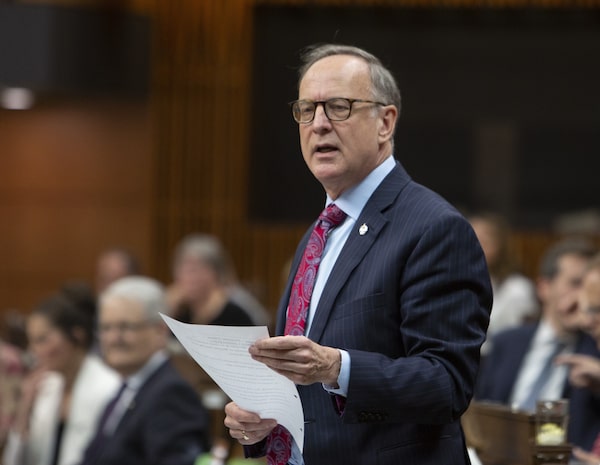
Parliamentary Secretary to the Minister of Foreign Affairs Rob Oliphant rises during Question Period in the House of Commons on Parliament Hill, in Ottawa on June 7, 2019.Fred Chartrand/The Canadian Press
One of the Liberal government’s point people on foreign policy says framing the Tories as soft on Ukraine isn’t helping the country fend off Russia’s invasion.
Toronto MP Rob Oliphant is parliamentary secretary to Foreign Affairs Minister Mélanie Joly, a job that has him travel on her behalf to events at home and abroad.
“I believe Canadians’ commitment (to Ukraine) is unwavering – and despite the political games we play, I believe the Opposition’s commitment is unwavering,” Oliphant said Wednesday.
“I may get in trouble for saying that, but I really believe that. And we only get ahead if we do that, and don’t play games with this,” he told the House of Commons foreign-affairs committee.
His comments come months into Liberals’ lambasting of Conservatives for their position on a bill to implement an updated Canada-Ukraine free trade deal, which became law this week.
The Liberals launched attack ads about the vote in Conservative-held Prairie ridings with large Ukrainian populations, accusing the Tories of “turning their backs on Ukraine.”
The Tories said they disagree with language in the deal that says both countries will promote carbon pricing, claiming it would impose a carbon tax on Ukraine.
Ukrainian President Volodymyr Zelensky signed the updated agreement and his country already has a carbon price. The Ukrainian Canadian Congress had also criticized the Tories for their opposition.
Analysts have repeatedly said that Moscow is seeking to drive wedges between and within Western countries over their level of support for Ukraine.
Asked about his comments, Oliphant clarified Thursday that he feels the Tories are still part of the problem. “While the Conservatives play politics with free trade and carbon pricing, they likely support Ukraine in its war with Russia,” he wrote in a text message.
Meanwhile, Ukraine’s ambassador to Canada told MPs that she believes sanctions are having a real impact on Moscow, despite reports that Russia’s economy has been relatively unscathed by pivoting to trade with countries like China.
“The Russian economy is degradating (at) high speed, but they are trying to send the message that … sanctions are not working,” Yuliya Kovaliv testified.
Russia’s embassy in Ottawa has decried Canada’s “meaningless” sanctions, writing last month that “Russian citizens and organizations couldn’t care less.”
Yet Kovaliv said sanctions carry more impact over time. She gave the example of Russia’s aerospace sector, which has had planes gradually become unusable because the country can’t access foreign parts.
Her concern is Russia circumventing sanctions, especially because Canadian-made military equipment is finding its way into Moscow’s hands.
“They are becoming very creative,” she said. “We need to be quicker and smarter, and also with the collaboration with industry, to work on making pre-emptive measures.”
Ukraine still wants rocket parts that Canadian officials say aren’t usable, Kovaliv added.
For months, the federal Conservatives have asked Ottawa to transfer its 83,303 units of motors for CRV7 rockets, which the Department of National Defence says the military can’t assemble because it lacks the other components.
“Indeed, (the) Ukrainian armed forces need them and they can use them,” Kovaliv testified.
“We are … trying to use even that equipment which is in the process of decommissioning. We don’t have much choice. But we already, I think, demonstrated for these last two years that we can use the technology; we can use the dedication of our engineers to make it work.”